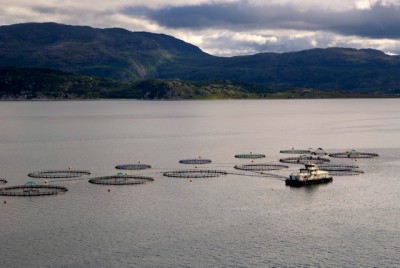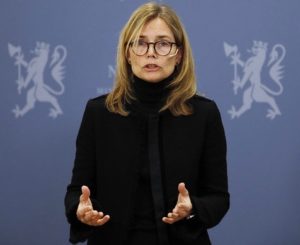Profitable salmon producers and other fish-farming operations won’t have to share more of their wealth with other Norwegians after all. A proposal to raise billions in new taxes tied to their use of waters in Norwegian fjords was dropped from the government’s revised state budget, and replaced witih a much less-taxing alternative.

Debate had been swirling for years over how maritime operations using Norway’s rich seas and fjords could “give back more” to the regions that allow fish-farming (called oppdrett in Norwegian) and to the state as well. Families active in fish farming routinely rank as among the wealthiest in the country, and businesses behind them are among the most profitable. Advocates of a tax reform that would force them to contribute more to Norway’s fellesskap (common good) have argued that it’s “typically Norwegian to share,” not least in the case of natural resources.
Debate spiked after the conservative government’s own commission looking into the matter recommended the so-called “salmon tax” last fall. The commission, headed by Professor Karen Helene Ulltveit-Moe at the University of Oslo, had been appointed by the government to evaluate how the tax system for use of public seas and waters should be formed to better serve the common interest.”
Moe and her group landed on a form of grunnrenteskatt, a tax akin to a lease on waters used for the large circular merder (pens) where salmon is raised. Norway is known for its sheltered fjords that feature favourable currents, waters rich in oxygen and with temperatures well-suited for fish farming. The tax plan was based on the idea that fish-farmers enjoy extraordinary returns on their operations because they have privileged access to the fjords, which in turn are part of the public domain. They thus should pay an extra tax on extra profits generated through use of such a natural resource, reckoned the commission.
Tax on ‘an exclusive right to our nature’
As four professors including Moe wrote in a commentary in newspaper Dagens Nærignsliv (DN), fish farmers have been given “an exclusive right to use parts of our nature.” They should pay for that, the professors reasoned, and the proceeds should be shared between the local municipalities where they operate and the state. They argued further that around 80 percent of concessions granted to fish farming operations were granted free of charge by the state. Only 3 percent involved fees.
Moe and her fellow professors added that the value of rights granted to Norway’s fish-farming industry has been put at around NOK 200 billion, while operators have paid just NOK 7 billion in taxes and fees over the years. “That seems unreasonable from the perspective of the common good,” they wrote.

The commission’s tax proposal met immediate opposition when presented last fall and their arguments ultimately were dismissed. Protests from the rich and powerful salmon producers were loud and never quieted down. The salmon industry in particular lobbied hard, even hiring one of Prime Minister Erna Solberg’s former so-called “spin doctors” and two public relations veterans to stop the salmon tax proposal. They also threatend to “flag out” their operations and move them abroad if the Norwegian government went forward with the salmon tax plan.
They won in the end, when Finance Minister Jan Tore Sanner dropped the tax plan from the revised state budget he presented earlier this week. Instead of imposing the extra tax that could have generated an estimated NOK 7 billion, Sanner and his government colleagues setteld on a new “production fee” on fish-farmed salmon, trout and rainbow trout that will generate an estimated NOK 500 million.
“The government is doing the opposite of what its own commission recommended,” lamented Aftenposten, which earlier had editorialized in favour of the tax, calling it “correct and reasonable.” Since the Center, Progress and Labour parties were against it, as were the Conservatives, the tax was doomed and salmon producers could celebrate heading into the upcoming holiday weekend.
NewsInEnglish.no/Nina Berglund

